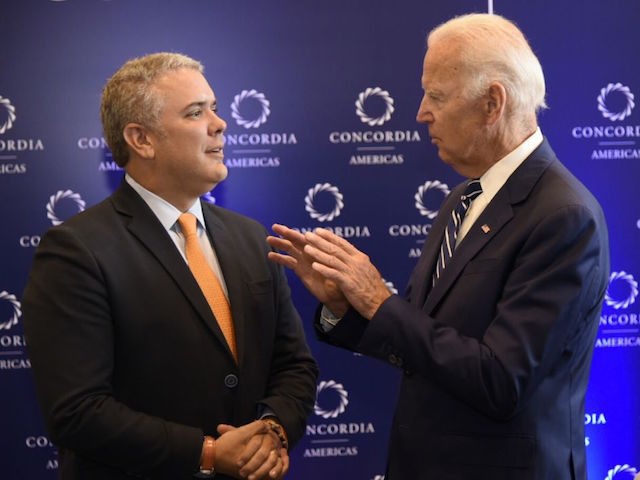Colombian President Iván Duque expressed discomfort on Monday with the Biden administration’s outreach to Venezuelan dictator Nicolás Maduro, whose gas President Joe Biden reportedly covets to alleviate shortages due to the Russia-Ukraine conflict.
Duque essentially asked Biden to think carefully before breaking ranks with Colombia on containing the odious Maduro regime.
Duque made his remarks to Reuters while attending an energy conference in Houston. The Colombian president addressed the surprise delegation to Venezuela sent on very short notice by the Biden administration, allegedly to negotiate the reduction of U.S. sanctions, in exchange for concessions such as Maduro denouncing his patron Russia for invading Ukraine.
“This is a topic that the United States will have to reflect about,” Duque said, tactfully advising Team Biden to pump its brakes.
“The United States has had a position about this we have shared, which is to call things by their name. And that government is a dictatorship,” Duque said of the Maduro regime.
Duque insisted the path forward for Venezuela lay through free and fair elections, of the sort that would be unlikely to keep Maduro in power. Maduro’s opponents see any chance of overthrowing Maduro slipping away as Biden reportedly prioritizes access to Venezuelan oil.
The Venezuelan opposition was stunned and angered by Biden’s outreach to Maduro, conceived and executed without their input. Venezuelan President Juan Guaidó was not notified about the Biden team’s visit to Caracas until the last minute. The United States considers Maduro, who was constitutionally removed from power in 2018, an usurper and Guaidó, sworn in officially in 2019, the legal president of Venezuela.
“It is foolish to think that Maduro will quit Russia when a great deal of the corruption funds have been deposited in Russia and when Russia, furthermore, is its greatest ally,” one of Guaidó’s senior aides told the Miami Herald on Monday.
“This is a mistake. To buy oil from Maduro is the same as buying oil from Putin,” he warned.
Guaidó’s aide noted that Venezuela’s production capacity, which has diminished greatly under Maduro’s inept socialist government, would not be capable of covering Russia’s lost oil output even if all of Venezuela’s oil was sold the United States – and most of it has already been sold to other customers already, prominently including China.
The Hill reported on Sunday that President Duque is due to visit the White House on Thursday, ostensibly “a clear sign that Democrats have fully buried the hatchet after a period of bilateral tension” with Colombia over its support for President Donald Trump – but the surprise visit to Venezuela may have complicated those plans.
It is also possible the Biden White House thinks it can simply string Duque along for a few more months until he loses the May presidential election to left-wing radical Gustavo Petro, who is currently leading by 20 points in the polls. Biden’s advisers might have similarly calculated that Guaidó and his opposition are fading as a serious threat to Maduro’s power.
Petro, who lost a close race to Duque in 2018, could turn Colombian policy upside-down in several respects, including the nation’s relationships with both the United States and Russia. Duque immediately and forcefully denounced the Russian invasion of Ukraine, but Petro refused to condemn Russia, instead using the crisis to launch a backhanded assault on U.S. policy in Latin America.
“There are those who would stupidly like to reproduce the Russian/Ukrainian conflict in our own region of coexistence: South America. What the constitution orders is not to participate ‘diplomatically’ in wars, but to seek world peace,” Petro said after the Russian invasion began.
Petro said in January he wants to phase out the oil and coal industries, which currently account for about half of Colombia’s exports, replacing them with a “knowledge-based, tourism-driven economy.”
Petro envisioned forming a “grand coalition” of like-minded ideologues across Latin America that would “speak much more strongly in a global context to fight against climate change, and to transition Latin America toward economies that are decarbonized, productive and based on knowledge.”
This vision, if realized, would greatly increase the value of Venezuelan and Russian oil, especially if Democrats keep the American energy industry paralyzed in accordance with their own climate change agenda.
Security and political analysts told The Hill they expected Russian leader Vladimir Putin to quickly and ruthlessly exploit the political and economic openings created by Colombia’s anticipated fall to the hard Left.
“I think you’re going to see [Russian] efforts and significant impacts particularly in Colombia, which would be the crown jewel, if you could get a government in Colombia that was willing to begin to decouple from the United States in significant ways,” said Douglas Farah of National Defense University’s Center for Complex Operations.
“This for Putin is a prime target of opportunity where he thinks he can even the score with the United States,” said David Kramer of the George W. Bush Institute.

COMMENTS
Please let us know if you're having issues with commenting.